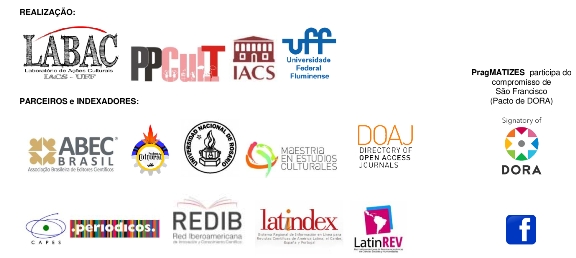Submissions
Submission Preparation Checklist
As part of the submission process, authors are required to check off their submission's compliance with all of the following items, and submissions may be returned to authors that do not adhere to these guidelines.- The submission file is in Microsoft Word (preferably), OpenOffice or RTF format.
- The text is in one and a half spaces; uses a 12-point Arial font; uses italics instead of underlining (except for URL addresses); Figures and tables are inserted in the text, not at the end of the document in the form of attachments.
Artigos (em Fluxo Contínuo)
Política padrão de seção
Dossiê 23: Artes e Culturas nas Cidades
Avaliação duplo cega e apresentação do dossiê por editores associados.
Dossiê 22 - Coletivos culturais - resistências, disputas e potências
Avaliação duplo cega.
Dossiê 21: Trabalho cultural e pre carização
PragMATIZES faz avaliação duplo cego dos artigos, e tem por política que ao menos um dos autores de cada artigo tenha o título de Doutor.Dossiê 18: Representações da Violência na Literatura
A violência tem se apresentado como um tema recorrente em pesquisas de estudiosos das literaturas. Em virtude disso, o dossiê “Representações da Violência na Literatura”objetiva reunir e divulgar pesquisas acadêmicas sobre diferentes modalidades da violência refletidas em obras literárias de variadas épocas e nacionalidades, a partir de diversificados enfoques teórico-metodológicos.Para essa edição, convidamosdoutoresa enviarem trabalhos em português, no formato de artigo científico inédito.Os trabalhos recebidos serão revisados em ordem de submissão por uma comissão de pareceristas às cegas.
As submissões poderão ser feitas até o dia 30 de novembro de 2019, através da plataforma da revista.
Editores do dossiê: Eloísa Porto C. A. Braem e Paulo César S. Oliveira (UERJ)
Dossiê 11:Múltiplos Carnavais: Economia e política nas manifestações culturais populares
O dossiê Múltiplos Carnavais: Economia e política nas manifestações culturais populares busca ampliar a discussão a respeito das relações econômicas e políticas que articulam, limitam e reconfiguram as manifestações culturais populares, em especial as múltiplas expressões carnavalescas presentes na cultura brasileira e latino-americana. Estaremos recebendo contribuições que problematizem diferentes e diversificadas práticas carnavalescas a partir de variados enfoques, como o olhar da performance, da gestão e organização da festa, das políticas culturais, dos processos de patrimonialização, das trocas econômicas e simbólicas, da ocupação urbana, da relação com o território, entre outras abordagens estéticas e teóricas.Dossiê 10: Economia Política da Comunicação e da Cultura na Íbero-América
O dossiê Economia Política da Comunicação e da Cultura na Íbero-América se insere no conjunto de atividades que pesquisadores europeus e latino-americanos vêm desenvolvendo para afirmar esse campo de pesquisa e que tem na União Latina de Economia Política da Informação, da Comunicação e da Cultura (ULEPICC) sua principal instituição. Nesse sentido, estaremos recebendo contribuições que abordem a centralidade econômica e política que a comunicação e a cultura possuem na producão capitalista, centralidade esta que se revela de diversos modos: na transversalidade da cultura e da comunicação, na convergência tecnológica e na digitalização dos meios eletrônicos, na expansão e novas configurações das indústrias culturais e criativas, na privatização do conhecimento, no desenvolvimento de capital intangível, nas culturas digitais, entre outros modos.
Organização do Dossiê Economia Política da Comunicação e da Cultura na Íbero-América:
Prof. Dr. Alexandre Barbalho
Copyright Notice
By forwarding an original to PragMATIZES, the authors agree that the copyright related to it is transferred to the Publishing. Articles and other writings are made available in PDF format from their publication, and they can be downloaded to institutional repositories and personal pages, provided that with their proper bibliographic indication.


